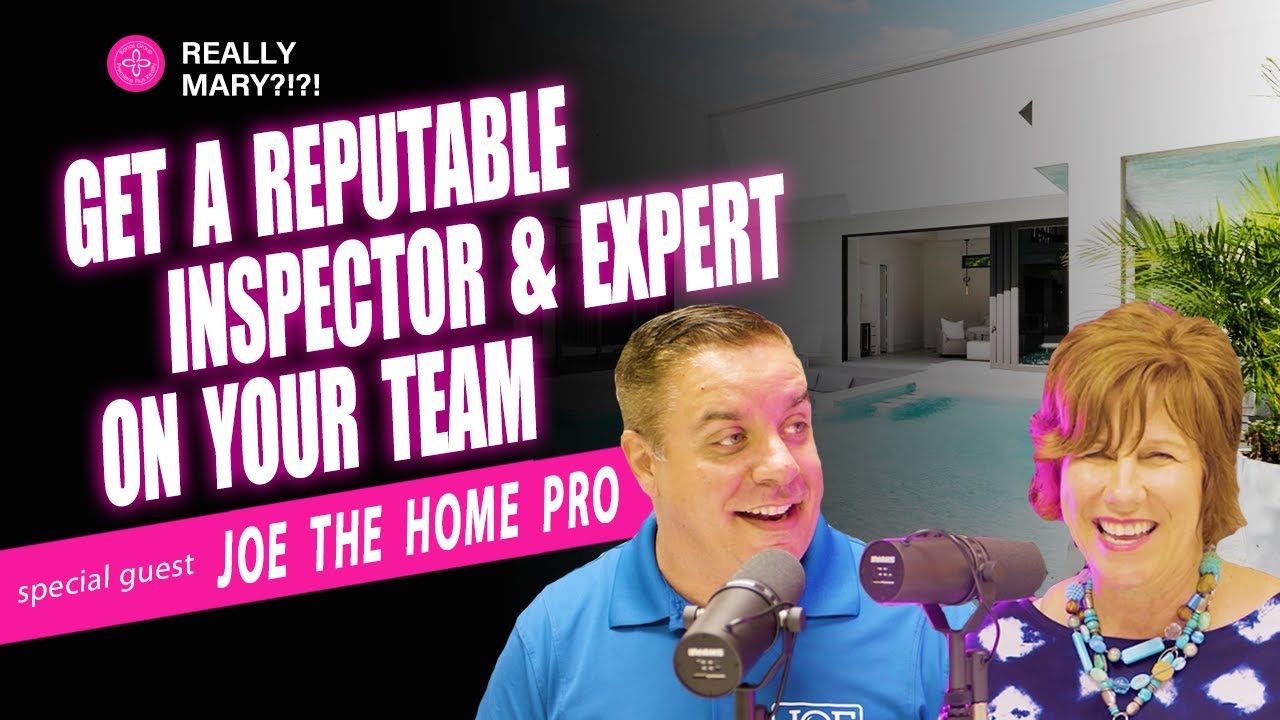
Mary Bartos of the Bartos Group presents a clear, practical guide to home inspections for buyers navigating the often-confusing menu of choices during a real estate transaction. This article synthesizes the insights shared by Mary and guest expert Joe The Home Pro, explaining which home inspections matter most in Southwest Florida, why specialized inspections are important, and how buyers can prioritize and act on inspection results.
Why Home Inspections Matter — Beyond the Basics
When buying a property, the phrase “home inspections” often brings a flood of questions: Which ones are required? Which are optional? Which will uncover costly surprises? In Southwest Florida, where seaside properties, older seawalls, and humidity-driven issues are common, the right set of inspections can reveal problems that dramatically affect property value, safety, and long-term maintenance costs.
As Joe The Home Pro explains, a standard home inspector is a generalist who evaluates many systems and components of a house, but certain conditions call for specialists. Those specialized home inspections — for seawalls, wells and septic systems, radon, and wood-destroying organisms (WDO) such as termites — dig deeper into areas where expertise and specialized equipment matter.
Common Specialized Home Inspections in Southwest Florida
Buyers in coastal Florida encounter a set of inspections that may be unfamiliar to people relocating from other parts of the country. Here are the most common specialized home inspections buyers should consider in the region, and why they matter.
Seawall Inspections
For waterfront properties, a seawall inspection is often essential. Seawalls have a finite lifespan and most locations do not require replacement at the time of original construction. A qualified marine or seawall inspector assesses structural integrity, signs of erosion, undermining, and corrosion — information that is critical if the seawall needs repair or replacement soon after purchase.
WDO (Wood-Destroying Organism) Inspections — Termites and More
In Florida, “it’s not if you get termites; it’s when you get termites,” Joe notes. WDO inspections look for active infestations and evidence of past activity in framing, attics, crawl spaces, and other vulnerable spaces. Even concrete-built homes can have issues because many termite species fly in. A WDO report helps buyers negotiate treatment and repairs before closing, or decide whether to proceed.
Radon Testing
Radon is a naturally occurring radioactive gas that can accumulate in buildings. While it is more commonly associated with northern climates and basements, radon can and does appear in Florida properties — particularly in multi-story condo towers. Joe points out that radon prevalence varies: some northern buyers assume every home has radon, while others assume Florida is exempt. The truth is somewhere in between.
A radon test typically involves placing a monitor in a home for 48 hours and then collecting the device for laboratory analysis. If elevated levels are found, mitigation systems can be installed to lower indoor radon concentrations.
Air Quality and Mold Testing
Mold is present in every environment to some degree — the key question is which types of mold and at what concentration. Air quality testing and mold sampling are especially important in humid climates. Samples are collected and shipped to an accredited lab where a scientist analyzes them and returns results, usually within about 24 hours.
Some people are highly sensitive to mold and can experience severe health impacts; others may notice no symptoms. An air quality report clarifies whether indoor mold levels are problematic and whether remediation is necessary.
Well and Septic System Inspections
For properties not connected to municipal water and sewer, wells and septic systems require specialist inspection. These systems are mechanical and biological in nature and often hidden; a malfunctioning well pump or failing septic drain field can lead to expensive repairs and health hazards. A specialist can test water quality, evaluate pump operation, and assess the condition of septic tanks and leach fields.
Who Performs Which Home Inspections?
Joe emphasizes the importance of using the right professional for each inspection. While a licensed home inspector provides a broad evaluation and can point out visible defects, specialists should be brought in for areas that require specific technical knowledge or equipment.
- General home inspector: structural elements, roofing, electrical, plumbing, HVAC, and visible interior/exterior issues.
- Seawall/marine inspector: structural condition of seawalls, pilings, and erosion-related concerns.
- WDO/termite inspector: evidence of wood-destroying organisms and active infestations.
- Radon testing technician: specialized monitors and interpretation of radon levels.
- Mold and air quality lab: sampling and scientific analysis of airborne or surface contaminants.
- Well/septic specialist: operational and sanitary evaluation of private water and wastewater systems.
How to Prioritize Which Home Inspections to Order
With limited time and sometimes tight budgets, buyers must prioritize. Here is a practical approach:
- Start with a comprehensive general home inspection to cover the big picture.
- If the property is waterfront, add a seawall inspection — the cost of seawall repair or replacement is large enough to affect purchase decisions.
- Order a WDO inspection in Florida regardless of construction type; evidence of active infestation can alter negotiations.
- If the home is a condo tower or sits in a zone with known radon readings, perform radon testing.
- If the house shows signs of moisture, water intrusion, or unexplained odors, add air quality and mold testing.
- For rural properties, always test wells and septic systems before closing.
What To Expect During the Inspection Process
Inspections typically occur during the option period or a similar contingency window in the purchase contract. Buyers should attend the inspection when possible, ask questions, and take notes. The inspector will prepare a written report that documents findings, photos, and recommendations.
Specialized inspections may take additional time and require testing equipment. For radon, a monitor is left in place for 48 hours. For mold and air quality, samples are collected and sent to a lab. The specialized inspector or lab will provide a report that complements the general home inspection.
How To Utilize Your Inspection Results
Inspection reports provide leverage and information:
- Negotiate repairs or credits: Use documented issues to ask the seller to repair defects or provide a price reduction or credit.
- Walk away if necessary: Significant issues uncovered in inspections — such as an imminently failing seawall or systemic termite damage — may justify terminating the contract under inspection contingencies.
- Plan for maintenance and budgeting: Even if issues are not deal-killers, inspection reports help buyers plan repairs, estimate annual maintenance costs, and prioritize upgrades.
Practical Tips for Buyers Scheduling Home Inspections
- Work with a local team: Local agents and inspectors understand regional risks such as termite species, humidity-related mold, and seawall conditions.
- Hire licensed specialists for critical systems: A general inspector is valuable but bring in specialists for seawalls, wells, septic systems, and any system requiring specialized testing.
- Attend inspections: Buyers who attend tend to better understand issues and ask targeted follow-up questions.
- Keep receipts and reports: Save all inspection reports and invoices for future reference and potential disclosure to future buyers.
- Balance cost and risk: Prioritize inspections that protect you from large, immediate expenses (e.g., seawall, septic, and major structural defects).
Conclusion
Home inspections are an essential step in the homebuying process, especially in regions with unique environmental and structural concerns. By understanding the difference between general and specialized inspections — and by prioritizing based on property type, location, and visible concerns — buyers can make informed decisions, negotiate effectively, and avoid unexpected expenses after closing.
Mary Bartos and Joe The Home Pro stress the value of experienced, local professionals: “These are the kinds of things that you want to have a real professional talk to you about,” Joe says, emphasizing that local experience and expertise matter when evaluating homes in Southwest Florida.
FAQ — Home Inspections
Q: How many home inspections do I really need?
A: It depends on the property. Every buyer should obtain a general home inspection. Beyond that, order specialized home inspections based on property type and visible indicators: seawall for waterfront homes, WDO in Florida, radon for certain condos or homes in known zones, mold testing if there is moisture or odor, and well/septic inspections for non-municipal systems.
Q: Are WDO inspections necessary for concrete-built homes?
A: Yes. Even concrete-built homes in Florida can experience termite activity because many species fly in. A WDO inspection looks for evidence of active infestation and can help buyers negotiate treatment and repairs.
Q: Is radon a concern in Florida?
A: Radon is less prevalent in Florida than in some northern states, but it does exist. Multi-story condo towers and certain newer builds with a lot of granite can show elevated radon. Testing is inexpensive and easy to perform; mitigation systems are available if levels are high.
Q: How long do specialized home inspections take?
A: It varies. A general home inspection typically takes a few hours. Radon monitoring requires a 48-hour placement. Mold and air quality samples are collected on-site and analyzed by a lab, with results often returned within 24 hours. Seawall and septic inspections depend on access and complexity.
Q: Can I rely on one inspector for everything?
A: A licensed general inspector is a great starting point and will note areas of concern, but specialized areas often require technicians with specific training and equipment. Use specialists for seawalls, radon, well and septic, and in-depth mold or structural concerns.
For more region-specific insights and help coordinating the right team of home inspectors, the Bartos Group and experienced local inspectors like Joe The Home Pro offer guidance tailored to Southwest Florida buyers. Prioritize inspections that protect you from major financial and safety risks — and always read inspection reports carefully before finalizing a purchase.
Contact Us Today! |
|
Providing you the experience you deserve! |
| Click me |
